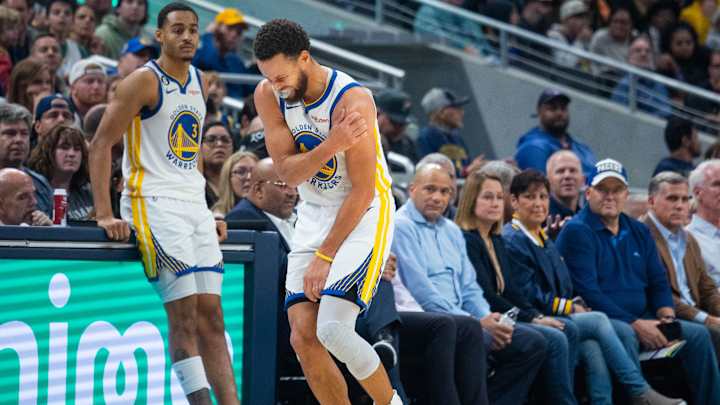Warriors Could Find Themselves in Deep Water Without Stephen Curry

In this story:
There’s really no way to dress up what the Stephen Curry injury means for the Warriors. Depending on the length of time he’s out with a shoulder injury—one that sounds like it will sideline him for at least a few weeks—Golden State could be in real trouble in and around the back end of the Western Conference playoff race.
Even before sourced reports claimed that Curry was poised to miss a number of weeks due to the shoulder malady, the Warriors stood at 14–15 on the season with a challenging slate of contests in the near future. They have one of the 10 hardest remaining schedules in the league, and over the next two weeks, seven of Golden State’s next eight opponents are clubs that would currently make the postseason, either as a play-in participant or as a top six seed. (The Warriors’ next four games—all against teams solidly in the Eastern Conference postseason race—are on the road, where Golden State is a worst-in-the-West 2–13 so far.) If you stretch Curry’s absence out closer to the one-month mark, things soften again by the end of that stretch, as Detroit, Orlando, San Antonio, Chicago and Washington—all outside the top 10 in either conference—would be on the docket should Curry need to rehabilitate for that long.
Regardless of who the Warriors are facing, though, without Curry, there is no such thing as an easy foe. To this point in the season, Golden State is a whopping 17.8 points better per 100 possessions offensively when Curry is on the floor; a differential that ranks in the league’s 100th percentile. With Steph, the Warriors’ offense notches what would be an NBA-record 120.8 points per 100; without him, the Golden State offense is a slog, and grinds out what would be equivalent to a league-worst 103.8 points per 100. Because of that, it’s not hard to imagine the Dubs—0–3 this season without Curry, and just 24–66 (26.6% win percentage) without him in the past three-plus campaigns—stinking up the joint without their franchise player available.
Steve Kerr has struggled all season to find bench units that can hold their own when Curry and the starters—who have one of the NBA’s best net ratings as a lineup—come off the floor. Some advanced metrics and statistical models before the season in some cases shouted at the top of their lungs that the Warriors had real flaws; ones that were either rooted in injury concerns, or doubts about the relative inexperience on Golden State’s bench. Now both have manifested, and the timing certainly isn’t great for a club that’s essentially been treading water all year, despite Curry playing some of the best basketball of his career.
If there’s a bright side, it’s that there’s little doubt about who will replace Curry—star reserve Jordan Poole has started in all three of the games Curry hasn’t played in this season—and that the team has been far better and more committed defensively in the last 10 games. Still, even with that improvement in effort and execution, the Dubs still rank just 19th on the season in defensive efficiency, and find themselves in the bottom 10 in overall rebound percentage.
Offensively, there is no fix for losing someone like Curry, who is the sun in Golden State’s solar system. He essentially is the team’s system, allowing everyone else easier passes and shots because of the gravitational pull Curry generates from defenses. So without him, the Dubs figure to have their hottest shooting hand tied behind their back for the coming weeks. It won’t be a surprise to anyone if that stretch looks flat-out ugly at times, as they simply try to survive.
